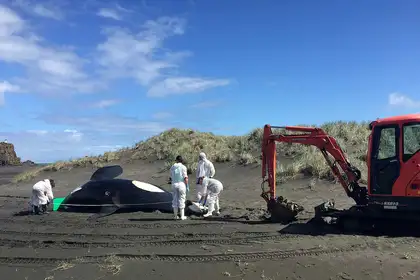
Early results of the death of an orca indicate no evidence of boat strike.
The investigation into the death of an orca washed up on Whatipu Beach has found no evidence of boat strike or live stranding.
Massey University Coastal-Marine Research Group Director, Dr Karen Stockin says due to the decomposed state of the carcass, the post-mortem was inconclusive from the perspective of giving a definitive cause of death.
"Nonetheless, a necropsy did still offer critical information relating to the whales death and notably, rule out some of the previous hypotheses raised prior.
"Firstly, the areas of reported bruising on the whales head and pectoral flipper, were on examination considered both small and relatively localised. No evidence of extensive blunt force trauma was observed during necropsy, indicating the whale unlikely died as a consequence of boat strike."
The necropsy revealed no evidence of trauma in the blubber indicative of a live stranding, suggesting the whale most likely died at sea and washed ashore. This refutes earlier speculation that the whale possibly live stranded after feeding in the shallows.
"Examination of the stomach contents revealed no evidence of any prey items, suggesting the whale would not have recently fed," Dr Stockin says. "This further supports our conclusion the whale wasn’t chasing prey and didn’t live strand. Despite being refuted, the hunting/accidental stranding theory is nonetheless reasonable given the identification of the whale."
Images of the dorsal fin suggest the whale dissected yesterday, is we believe, known to the Orca Research Trust as ‘Nibble’. If this indeed is confirmed by the trust, this orca has a prior history of live stranding when chasing prey, as observed in Whangarei Harbour in 2016.
While the state of decomposition prevented examination of most internal organs, blubber and teeth samples were still taken to age the whale and correlate age against pollutant burden.